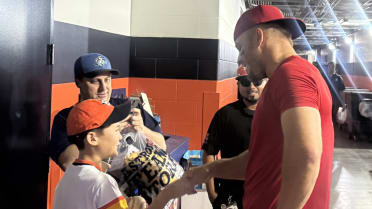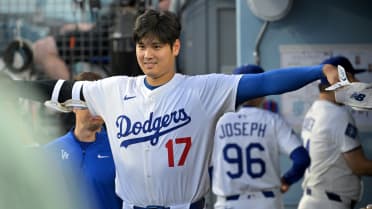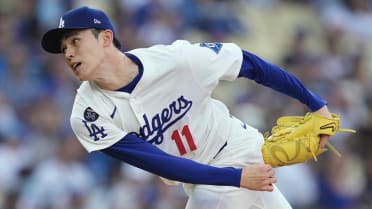LOS ANGELES -- Even if they're still a little too young to fully understand it, the girls participating in this weekend's Trailblazer Series in Los Angeles have already carved out their unique, special place in sports history.
Girls playing baseball is not a new thing, of course. But girls having myriad opportunities to play organized baseball, together, at a young age, rather than have to try to fit in as the only girl on a team full of boys, is still somewhat of a new concept.
If Major League Baseball's vision is carried out, girls playing baseball -- not softball, but baseball -- will simply become a new norm. It certainly is this weekend for the approximately 100 girls, ages 11-13, who are playing the Trailblazer Series at the MLB Youth Academy in Compton. A successful inaugural tournament a year ago inspired MLB and USA Baseball to make this a regular event, further ensuring girls are given the same opportunities to play organized baseball as the boys.
"These girls are ballers, they're really out there, they're playing, they're excited," MLB chief diversity & inclusion officer Renee Tirado said to the participants during a dinner reception Friday night to kick off the event. "We couldn't wait to reinvest in this and bring you all back this year and continue to make this grow."
• At Trailblazer Series, role models abound
The effort certainly has the backing of generations of well-known women who didn't have such an easy time when they were carving out their niche in the game. Many of those women are currently in Los Angeles to help celebrate the Trailblazer Series, some of whom spoke to the group at Friday's kickoff dinner.
That list included Olympic gold medalist Jennie Finch, who currently serves as Youth Programs ambassador for MLB. A former star pitcher at the University of Arizona, Finch told the girls she loved "the teamwork, the discipline, the sacrifice" that sports exposed her to.
She also loved the confidence sports gave her when she was an awkward kid looking for an outlet.
"I was bigger than everyone else," the 6-foot-1 Finch said. "I never fit in, ever, ever. Then I realized, through sport, that my height was a gift. My biceps were bigger than most of the boys. It was cool because I could hang tough with my brothers, but it wasn't so cool in so many other situations. I always felt awkward and not a part of it. Through sport, I was."
Finch was one of several trailblazers who attended the dinner. Three stars from the All-American Girls Professional Baseball League were there, too, as special guests of MLB this weekend: Maybelle "Mae" Blair, Shirley "Hustle" Burkovich and Jeneane Lesko. Their careers were among those highlighted in the 1994 hit movie "A League of Their Own."
Three high-ranking women who work in baseball also shared their life and career experiences during a panel discussion: Molly Jolly, senior vice president of finance and administration for the Los Angeles Angels; Nichol Whiteman, executive director of the Los Angeles Dodgers Foundation; and Shelagh Dillon, senior director of security operations for Major League Baseball.
The panelists spoke of their current job responsibilities and the challenges they faced as younger people when their careers were first starting. They were also asked to name some of their favorite memories working in their respective jobs.
Unveiling the Jackie Robinson statue at Dodger Stadium last year was a particular highlight for Whiteman, who this weekend will be part of the Dodgers' celebration of the anniversary of Robinson breaking the color barrier on April 15, 1947.
"I essentially work for Jackie's team, and I'm doing that work, and that was really special for me," Whiteman said of the statue unveiling.
Major League Baseball's long-term goal is two-fold: to continue to encourage girls to play baseball, and also to inspire them to stick with the game as they get older, especially if they want to someday pursue careers in the industry.
"What's important to us at baseball is to make sure you stay connected to us your entire lives," Tirado said. "Hopefully some of you will come back and work in baseball. I believe somebody in this room will be a general manager, a president and/or the Commissioner of baseball. Because you all have it in your blood."
Alyson Footer is a national correspondent for MLB.com. Follow her on Twitter @alysonfooter.



